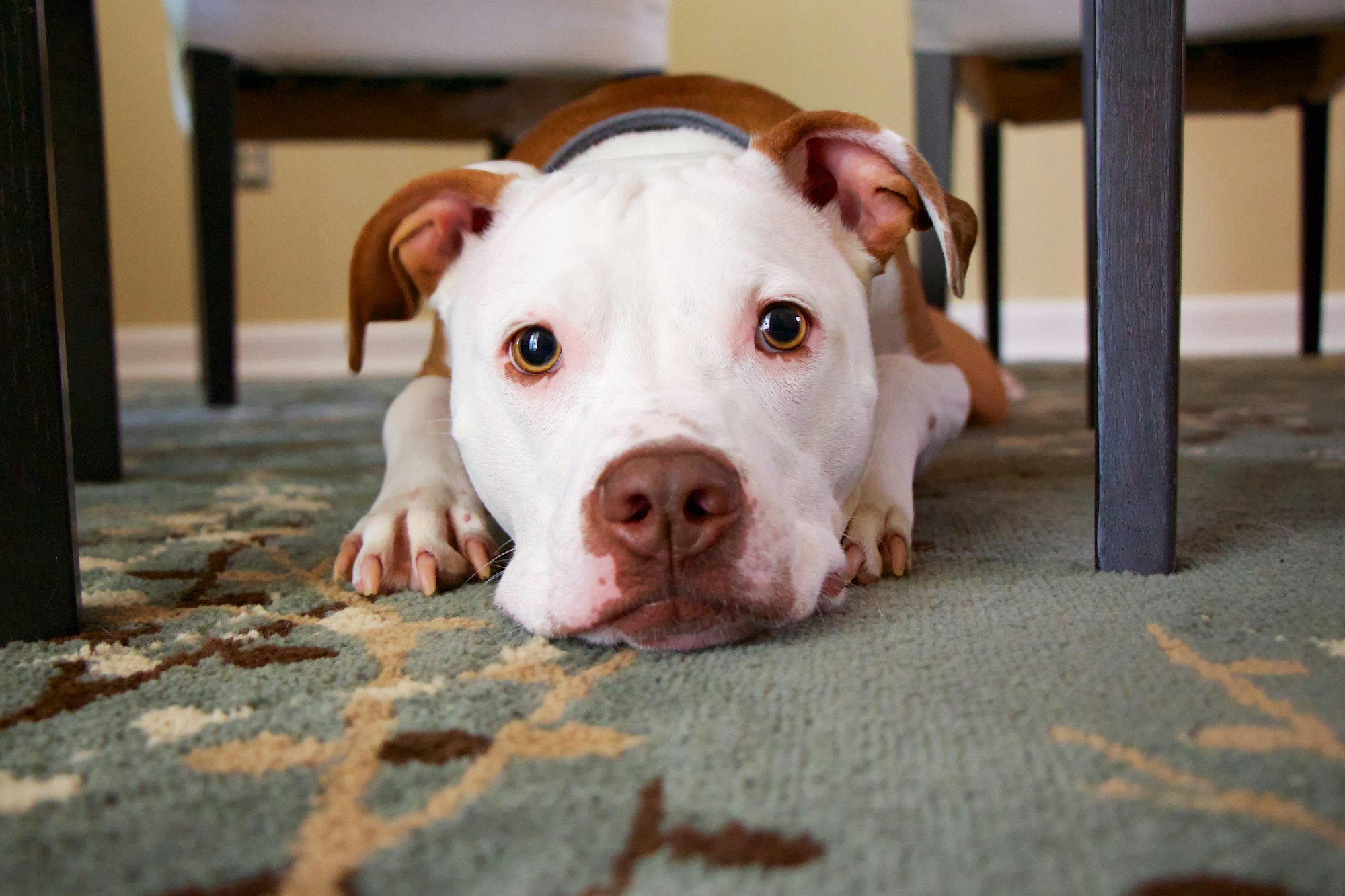As our beloved canine companions age, they may experience cognitive decline, much like humans. Canine Cognitive Dysfunction (CCD), also known as doggy dementia, is a condition that affects senior dogs, leading to a decline in cognitive function. This article will explore the topic of canine cognitive dysfunction, its signs and symptoms, risk factors, diagnosis, treatment options, and ways to support dogs with cognitive decline.

What is Canine Cognitive Dysfunction?
Canine Cognitive Dysfunction refers to a progressive neurological condition that affects aging dogs. Similar to Alzheimer's disease in humans, CCD results in a decline in cognitive abilities, memory loss, and behavioral changes in dogs. It is estimated that a significant number of dogs over the age of 10 experience some degree of cognitive dysfunction.
Signs and Symptoms of Canine Cognitive Dysfunction
Identifying the signs and symptoms of CCD is crucial for early intervention. Some common signs of canine cognitive dysfunction include:
1. Disorientation and Confusion: Dogs with CCD may appear disoriented, get lost in familiar surroundings, or exhibit difficulty finding their way around the house or yard.
2. Changes in Sleep Patterns: Sleep disturbances are common in dogs with cognitive dysfunction. They may sleep more during the day and experience restlessness or pacing at night.
3. Loss of Housetraining: A dog that has been housetrained may start having accidents inside the house due to cognitive decline.
4. Decreased Interaction and Social Withdrawal: Dogs with CCD may become less interested in social interactions, both with humans and other animals. They may also display increased irritability or aggression.
5. Loss of Interest in Previously Enjoyed Activities: A dog that once enjoyed going for walks, playing fetch, or engaging in mentally stimulating activities may lose interest in these activities.
6. Changes in Vocalization: Some dogs with CCD may experience changes in their vocalization patterns, such as increased barking or howling.
7. Anxiety and Increased Restlessness: Restlessness, pacing, and increased separation anxiety can be signs of cognitive dysfunction in dogs.
These signs and symptoms may vary in intensity and progression, and it is crucial to consult with a veterinarian if any changes are observed in an aging dog.

Risk Factors for Canine Cognitive Dysfunction
Several risk factors contribute to the development of Canine Cognitive Dysfunction. These include:
1. Age: CCD primarily affects older dogs, with the risk increasing as they advance in age.
2. Breed Predisposition: Certain dog breeds, such as Beagles, Boxers, and Dachshunds, are more prone to developing CCD.
3. Genetics: There may be a genetic component to CCD, with some dogs being more genetically susceptible to cognitive decline.
4. Chronic Inflammation and Oxidative Stress: Conditions that cause chronic inflammation and oxidative stress can contribute to cognitive dysfunction in dogs.
5. Environmental Factors: Poor nutrition, lack of mental stimulation, and a sedentary lifestyle can increase the risk of CCD in dogs.
6. Underlying Health Conditions: Dogs with pre-existing health issues, such as cardiovascular disease or metabolic disorders, may be at a higher risk of developing CCD.
Understanding these risk factors can help dog owners take proactive measures to promote cognitive health and potentially reduce the risk of CCD.
Diagnosing Canine Cognitive Dysfunction
To diagnose Canine Cognitive Dysfunction, a thorough veterinary evaluation is necessary. The diagnostic process may include:

1. Physical Examination: A veterinarian will conduct a comprehensive physical examination of the dog to assess overall health and identify any underlying conditions.
2. Medical History Assessment: The veterinarian will review the dog's medical history, including behavioral changes and any other relevant information provided by the owner.
3. Behavioral Observation: The veterinarian will observe the dog's behavior during the appointment, noting any signs indicative of CCD.
4. Rule Out Other Conditions: Since some medical conditions can mimic the symptoms of CCD, the veterinarian will perform tests to rule out other potential causes. These may include blood work, urinalysis, and neurological assessments.
5. Cognitive Function Testing: Various cognitive function tests may be employed to evaluate the dog's cognitive abilities. These tests assess memory, problem-solving, and learning capabilities.
The combination of a thorough physical examination, medical history assessment, and cognitive function testing allows veterinarians to make an accurate diagnosis of CCD.
Treatment Options for Canine Cognitive Dysfunction
While there is no cure for CCD, several treatment options can help manage the symptoms and slow down the progression of cognitive decline. These may include:
· Prescription medications: Certain medications can help improve cognitive function and manage behavioral changes associated with CCD.
· Antioxidant supplements: Antioxidants like Vitamin E and Omega-3 fatty acids have shown some promise in supporting cognitive health in dogs.
· Environmental enrichment: Providing a stimulating and engaging environment can help keep the dog's mind active and slow down cognitive decline.
· Diet and nutrition: Specialized diets formulated with brain-supportive nutrients may be recommended for dogs with CCD.
Lifestyle Changes to Support Cognitive Health in Dogs
1. Maintain Routine: Establishing and maintaining a consistent daily routine can help reduce anxiety and confusion in dogs with CCD. Regular feeding times, exercise routines, and sleep schedules provide a sense of stability and familiarity.
2. Create a Safe Environment: Make sure your home environment is safe and free from hazards. Use baby gates to restrict access to stairs or areas that may pose a risk. Provide comfortable bedding and ensure good lighting to reduce disorientation.
3. Minimize Stressors: Dogs with CCD may become more sensitive to loud noises, sudden changes, or disruptions. Minimize stressors by creating a calm and structured environment. Provide a quiet space where your dog can retreat when feeling overwhelmed.
4. Maintain Social Interaction: Social interaction is crucial for a dog's overall well-being. Engage in regular play sessions, and gentle exercise, and provide opportunities for socialization with familiar dogs or people. This helps keep the mind active and provides mental stimulation.
In addition to medical interventions, certain lifestyle changes can significantly impact a dog's cognitive health. Here are some strategies to consider:
1. Mental Stimulation and Enrichment Activities
1. Puzzle Toys: Engage your dog's mind with puzzle toys that require problem-solving skills to obtain treats or rewards. These toys keep dogs mentally engaged and help stimulate their cognitive abilities.
2. Obedience Training: Continue to engage in obedience training with your dog, focusing on positive reinforcement methods. This provides mental stimulation, reinforces previous learning, and helps maintain a sense of accomplishment.
3. Sensory Enrichment: Introduce your dog to new smells, textures, and sounds. Take them on different walking routes, allow them to explore new environments, and provide opportunities for sensory experiences. This helps keep their mind active and engaged.
4. Interactive Play: Engage in interactive play sessions with your dog, using toys that require mental engagement and problem-solving. Play hide-and-seek games or teach them new tricks to keep their mind stimulated.
2. Diet and Nutrition for Cognitive Support
1. Balanced Diet: Provide your dog with a balanced and nutritious diet. Opt for high-quality dog food that contains essential nutrients, vitamins, and minerals. Consult with your veterinarian for specific dietary recommendations based on your dog's age, breed, and health condition.
2. Antioxidants and Omega-3 Fatty Acids: Incorporate foods rich in antioxidants and omega-3 fatty acids into your dog's diet. These nutrients have been associated with brain health and may help support cognitive function. Foods such as blueberries, spinach, salmon, and chia seeds are excellent sources.
3. Supplements: Consult with your veterinarian about the use of supplements to support cognitive health in dogs with CCD. Certain supplements, such as antioxidants or omega-3 fatty acid supplements, may be recommended to enhance cognitive function.
4. Hydration: Ensure that your dog has access to fresh and clean water at all times. Proper hydration is essential for overall health, including cognitive function.
Regular exercise is essential for dogs with CCD, as it provides numerous benefits for their overall well-being and cognitive health. Here's why regular exercise is required:
1. Physical Health: Exercise helps maintain muscle tone, supports cardiovascular health, and prevents obesity. It promotes overall physical well-being and helps manage any underlying health conditions that may contribute to cognitive decline.
2. Mental Stimulation: Exercise provides mental stimulation, which is crucial for dogs with CCD. Exploring new environments, engaging in interactive play, and participating in obedience training keep the mind active and stimulated.
3. Stress Reduction: Regular exercise helps reduce stress and anxiety in dogs. It provides an outlet for pent-up energy and promotes the release of endorphins, which contribute to a sense of well-being.
4. Social Interaction: Exercise often involves social interaction, whether with other dogs or humans. This socialization is beneficial for dogs with CCD, as it helps maintain their social skills and prevents isolation.
It is necessary to tailor the exercise routine to your dog's abilities and consult with your veterinarian to ensure it is appropriate for their health condition.
3. Veterinary Care and Medications
Regular veterinary care is crucial for dogs with CCD to monitor the progression of the condition and manage any underlying health issues. Here's why veterinary care and medications are essential:
1. Diagnosis and Monitoring: A veterinarian can provide an accurate diagnosis of CCD and rule out other potential causes of cognitive decline. They can also monitor the progression of the condition and adjust the treatment plan accordingly.
2. Medications: In some cases, veterinarians may prescribe medications to manage the symptoms of CCD. These medications can help improve cognitive function, reduce anxiety, or address underlying medical conditions that contribute to cognitive decline. It is significant to follow your veterinarian's guidance and closely monitor your dog's response to the prescribed treatments.
3. Regular Check-ups: Regular veterinary check-ups allow for ongoing evaluation of your dog's overall health and well-being. The veterinarian can assess any changes in symptoms, review medications if necessary, and provide guidance on managing CCD effectively.
Consult with your veterinarian to determine the appropriate treatment options and medications for your dog with CCD.
Environmental Modifications to Assist Dogs with Cognitive Dysfunction
Making environmental modifications can greatly assist dogs with CCD in navigating their surroundings and reduce confusion. Here are some modifications to consider:
1. Visual Cues: Place visual cues throughout your home to help guide your dog. These cues can include brightly colored tape on stair edges or walls to improve visibility and assist with navigation.
2. Baby Gates: Use baby gates to restrict access to hazardous areas or rooms where your dog may get disoriented or lost. This ensures their safety and minimizes the risk of accidents.
3. Comfortable Bedding: Provide your dog with comfortable bedding in a quiet area of the house. This creates a safe and cozy space where they can rest and feel secure.
4. Good Lighting: Ensure that your home is well-lit, especially during nighttime. Sufficient lighting helps reduce disorientation and enhances your dog's ability to see and navigate their environment.
5. Minimize Clutter: Remove unnecessary objects and clutter from your home, as they can confuse or distract dogs with CCD. A clear and organized living space promotes a calmer and more predictable environment.
By implementing these environmental modifications, you can create a supportive and safe living environment for your dog with CCD.
Creating a Safe and Comfortable Environment

Ensuring a safe and comfortable environment is vital for dogs with cognitive dysfunction. Here are some tips to consider:
· Remove potential hazards or obstacles that can cause injury.
· Maintain a consistent routine to reduce confusion and anxiety.
· Provide a cozy and quiet space for resting and sleeping.
· Use visual cues and markers to help your dog navigate their environment.

Supportive Care and Management Strategies
Caring for a dog with cognitive dysfunction requires patience, understanding, and a holistic approach. Some additional strategies to support their well-being include:
· Maintain a regular daily routine.
· Provide plenty of affection and reassurance.
· Avoid sudden changes or disruptions in their environment.
· Engage in positive reinforcement training methods.
· Use calming techniques such as massage or gentle touch.
FAQs (Frequently Asked Questions)
1. Can Canine Cognitive Dysfunction be cured?
No, there is currently no cure for Canine Cognitive Dysfunction. However, various management strategies and treatments can help improve symptoms and slow down cognitive decline.
2. How can I prevent Canine Cognitive Dysfunction?
While it is not always possible to prevent CCD entirely, you can reduce the risk by maintaining a healthy lifestyle for your dog, including regular exercise, mental stimulation, a balanced diet, and routine veterinary care.
3. Are there any medications available for Canine Cognitive Dysfunction?
Yes, certain medications can be prescribed by veterinarians to help manage the symptoms and improve cognitive function in dogs with CCD.
4. Can younger dogs develop Canine Cognitive Dysfunction?
CCD is more commonly observed in older dogs, typically over the age of 10. However, in rare cases, younger dogs can also develop cognitive dysfunction, usually due to underlying medical conditions or genetic factors.
5. How long can a dog live with Canine Cognitive Dysfunction?
The progression and lifespan of dogs with CCD can vary. Some dogs may experience a gradual decline over several years, while others may deteriorate more rapidly. Early detection, proper management, and supportive care can help improve their quality of life and prolong their lifespan.
Conclusion
Canine Cognitive Dysfunction is a common condition in aging dogs that can significantly impact their quality of life. Recognizing the signs and symptoms, seeking timely veterinary care, and implementing lifestyle changes can help manage the condition and support your dog's cognitive health. By providing a stimulating environment, appropriate nutrition, and love and care, you can help your furry companion age gracefully and enjoy their golden years to the fullest.